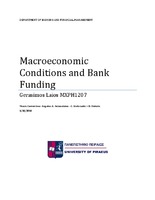Macroeconomic conditions and bank funding

Προβολή/
Θεματική επικεφαλίδα
Bank funds ; Bank loans ; Bank capital ; International banking ; Finance institutions ; MoneyΠερίληψη
The recent financial crisis has exposed macroeconomic deficiencies that were previously concealed by easy access to credit. The implosion of the subprime mortgage lending bubble triggered a chain reaction of deleverage. The massive credit crunch led the interbank market to a standstill. With wholesale funding freezing, creditors began scrutinizing the solvency and liquidity of all counterparties. At the last link of this chain process were the sovereign balance sheets. The countries with the weakest macroeconomic fundamentals found themselves unable to find creditors in the international money markets to refinance their debts at sustainable interest rates and were forced to seek help from the International Monetary Fund, -and in the Eurozone- the European Central Bank and the European Commission. Distressed countries were forced to take austerity measures while overhauling their economies in order to become more competitive. A key to a country’s competitiveness and economic growth is the financial health and stability of its banking system, as it the main channel for financing productive investments that increase economic output. In this thesis we examine the implications of a country’s current account balance, i.e. how much money moves in and out of domestic borders, on the ability of its banks to draw funds from international money markets, and vice versa.


